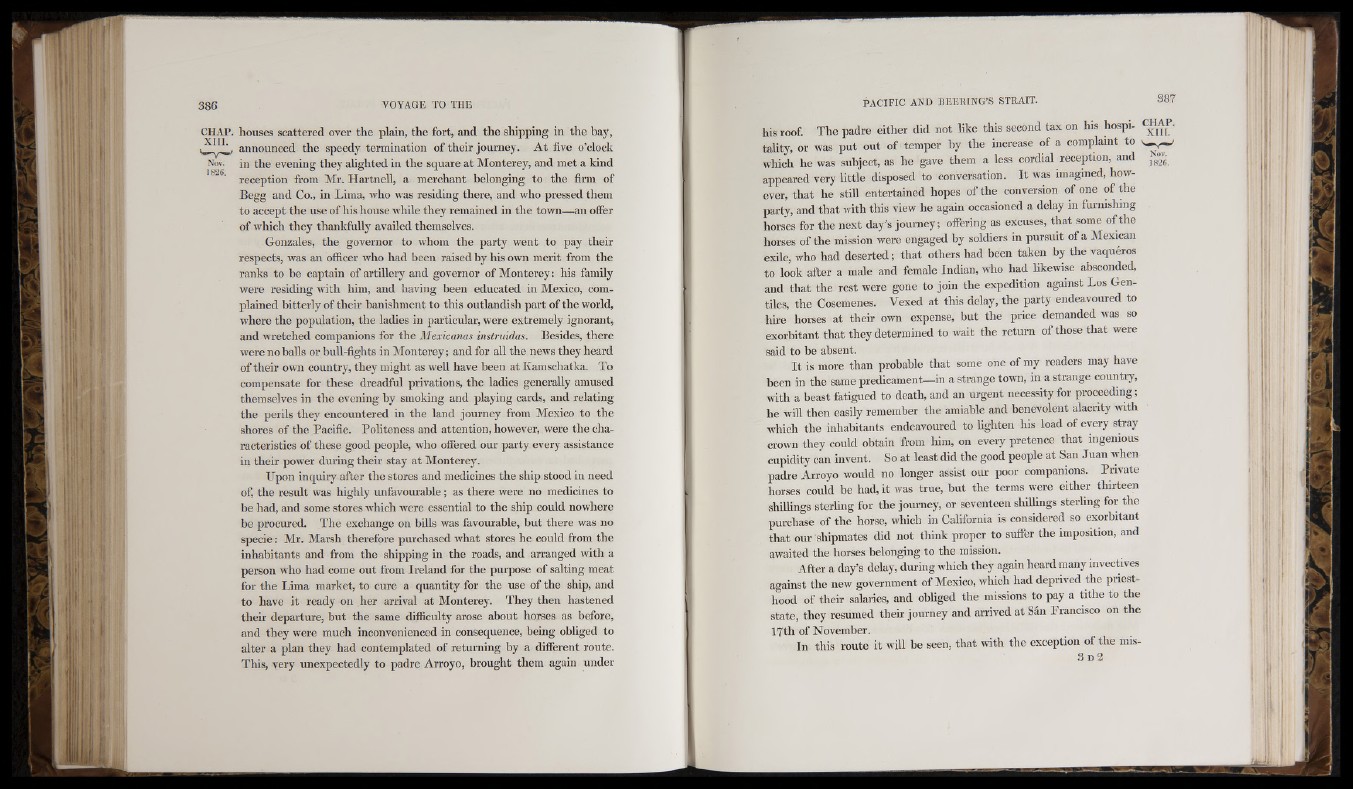
I' ií
houses scattered over the plain, the fort, and the shipping in the bay,
announced the speedy termination of their journey. At five o’clock
in the evening they alighted in the square at Monterey, and met a kind
reception from Mr. Hartnell, a merchant belonging to the firm of
Begg and Co., in Lima, who was residing there, and who pressed them
to accept the use of his house while they remained in the town—an offer
of which they thankfully availed themselves.
Gonzales, the governor to whom the party went to pay their
respects, was an officer who had been raised by his own merit from the
ranks to be captain of artillery and governor of Monterey: his family
were residing with him, and having been educated in Mexico, complained
bitterly of their banishment to this outlandish part of the world,
W'here the population, the ladies in particular, W'ere extremely ignorant,
and wretched companions for the Mexicanas instruidas. Besides, there
W'ere no balls or bull-fights in Monterey; and for all the news they heard
of their own country, they might as well have been at Kamsehatka. To
compensate for these dreadful privations, the ladies generally amused
themselves in the evening by smoking and playing cards, and relating
the perils they encountered in the land journey from Mexico to the
shores of the Pacific. Politeness and attention, however, were the characteristics
of these good people, who offered our party every assistance
in their power during their stay at Monterey.
Upon inquiry after the stores and medicines the ship stood in need
of, the result was highly unfavourable; as there were no medicines to
be had, and some stores which were essential to the ship could nowhere
be procured. The exchange on bills was favourable, but there was no
specie; Mr. Marsh therefore purchased what stores he could from the
inhabitants and from the shipping in the roads, and arranged with a
person who had come out from Ireland for the purpose of salting meat
for the Lima market, to cure a quantity for the use of the ship, and
to have it ready on her arrival at Monterey. They then hastened
their departure, but the same difficulty arose about horses as before,
and they were much inconvenienced in consequence, being obliged to
alter a plan they had contemplated of returning by a different route.
This, very unexpectedly to padre Arroyo, brought them again under
his roof. The padre either did not like this second tax on his hospitality,
or was put out of temper by the increase of a complaint to
which he was subject, as he gave them a less cordial reception, and
appeared very little disposed to conversation. It was imagined, however,
that he still entertained hopes of the conversion of one of A e
party, and that with this view he again occasioned a delay in furnishing
horses for the next day’s journey; offering as excuses, that some of the
horses of the mission were engaged by soldiers m pursuit of a Mexican
exile, who had deserted; that others had been taken by the vaquéros
to look after a male and female Indian, who had hkewise absconded,
and that the rest were gone to join the expedition against Los Gentiles,
the Cosemenes. Vexed at this delay, the party endeavoured to
hire horses at their own expense, but the price demanded was so
exorbitant that they determined to wait the return of those that were
said to be absent.
It is more than probable that some one of my readers may have
been in the same predicament—in a strange town, in a strange country,
with a beast fatigued to death, and an urgent necessity for proceeding;
he will then easily remember the amiable and benevolent alacrity with
which the inhabitants endeavoured to lighten his load of every stiay
crown they could obtain from him, on every pretence that ingenious
cupidity can invent. So at least did the good people at San Juan when
padre Arroyo would no longer assist our poor companions. Private
horses could be had, it was true, but the terms were either thirteen
shillings sterhng for the journey, or seventeen shiUings sterling for the
purchase of the horse, which in California is considered so exorbitant
that our shipmates did not think proper to suffer the imposition, and
awaited the horses belonging to the mission.
After a day’s delay, during which they again heard many invectives
against the new government of Mexico, which had deprived the priesthood
of their salaries, and obliged the missions to pay a tithe to the
state, they resumed their journey and arrived at Sán Francisco on the
1 7 th of November.
In this route it will be seen, that with the exception of the mis-
3 d 2